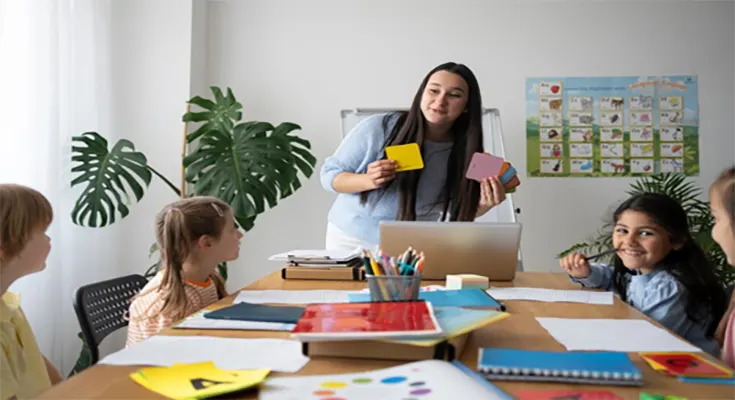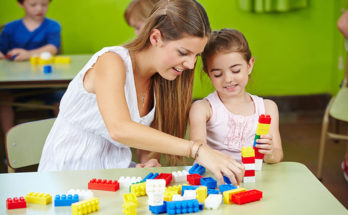Early learning is the education and experiences children receive during their formative years. This period usually runs from birth until age eight. This crucial period is critical to a child’s development in terms of cognitive, emotional and social skills. Early childhood education is more than just a way to prepare children for the school. It also gives them the necessary skills and abilities for a lifetime of success in relationships, learning and personal growth.
Early Childhood Education is Important
Brain development is rapid in the first few years of life. Early experiences have a direct impact on brain architecture and are the foundation of future learning, behaviour, and wellbeing. Early learning programs of high quality provide children with essential life skills, such as:
- Cognitive Skill: Activities which encourage critical thinking, problem-solving and creativity can help children to develop strong decision making abilities.
- Social skills: Interactions between peers and educators encourage teamwork, communication and empathy.
- Emotional Skill: Early Learning fosters emotional regulation and self-awareness.
- Physical Skill: Art, play-based activities and outdoor exploration enhance fine and gross motor abilities, which promotes overall physical development.
Components of Effective Early Learning
Early learning environments must include key components to foster holistic development in order to achieve positive results.
1. Play Based Learning
Play is essential to the growth and development of a child. Play allows children to explore the world around them, try out new ideas and learn problem-solving techniques. Building with blocks, role playing, and creative activities promote imagination, critical thinking, and curiosity.
2. Structured Curriculum
A well-designed program introduces literacy, numeracy and logical reasoning skills in an age-appropriate, engaging manner. Many methods are used to make learning fun and interactive for young minds.
3. Social Interaction
Early learning environments encourage communication and collaboration between children and their peers. Group activities, shared play, and team projects teach children respect, cooperation, and relationship-building skills that are essential for future success.
4. Emotional support
Nurturing an environment that fosters confidence and emotional wellbeing is essential. Teachers and caregivers are crucial in helping children to feel valued and secure.
5. Parental involvement
The first teacher of a child is his or her parents. Parents who actively engage in early learning, whether through regular communication with teachers or reinforcement of classroom concepts by parents at home, create a solid foundation for future success.
Long-Term Benefits of Early Learning
Early learning has long-lasting benefits that continue into adulthood. Early education is more likely to lead to children who:
- Do well in school.
- Foster positive relationships by developing strong social and emotional abilities.
- After completing high school, you can pursue further education or training.
- As an adult, you can find a stable and fulfilling job.
- Contribute positively to the community and society.
These results highlight the value of investing in early learning, both as a personal investment and as a societal one.
How to Choose the Right Early Learning Program
Parents must make an informed decision when choosing the best early learning environment for their child. Consider the following factors to ensure that a program is aligned with a child’s needs:
- Philosophy of the Program: Is there a balance between structured learning and playing?
- Teacher Qualifications: Are educators trained and experienced in early child education?
- Safety & Facilities: Does the environment provide a safe, clean and age-appropriate environment?
- Learning activities: Does this program offer a range of learning activities that promote exploration, creativity and growth?
- Parental involvement: Is the program open to communication with parents and offers opportunities for participation?
Early learning is about more than preparing children for academic success—it’s about equipping them with the tools they need to thrive in all areas of life. By providing enriching experiences during their formative years, children develop the skills, resilience, and curiosity needed for a brighter future. Whether through play, structured learning, or emotional support, early learning builds a foundation that empowers children to reach their full potential.
This article was written by an expert at Baby Fox Academy of Florida. Baby Fox Academy, voluntary pre-kindergarten Sarasota, FL, is your premier choice for high-quality early childhood education, blending structured learning with the magic of play. Baby Fox Academy is owned and operated by Laurie McCracken and Matt McCracken. Laurie has over 25 years of experience working in the early childhood field. Our play-based program supports each child’s development by balancing activities indoors and outdoors that develop fine motor skills, language, creativity and independence. Children develop important skills through engaging tools such as puzzles, drama play, and art. WatchMeGrow allows parents to check in at any time via “Trail Cams”, giving them peace of mind as their children play, learn and grow. Baby Fox Academy is a nurturing learning environment that will inspire your child to love learning for life.



